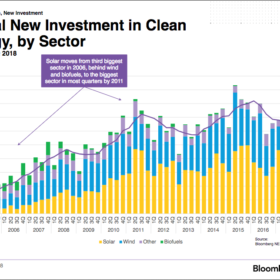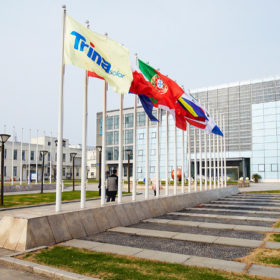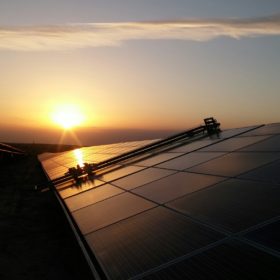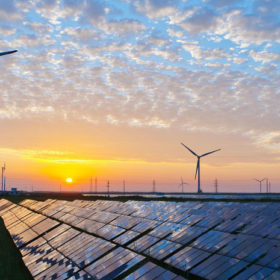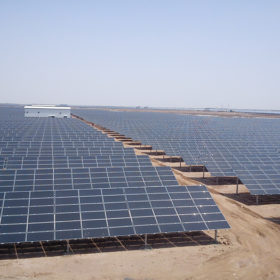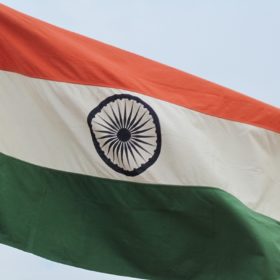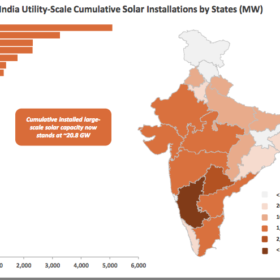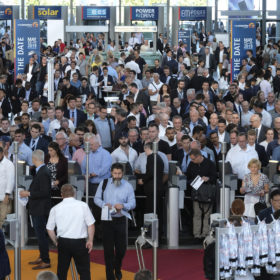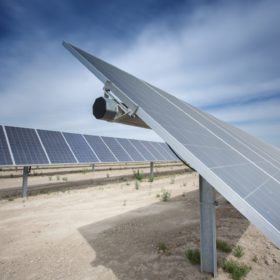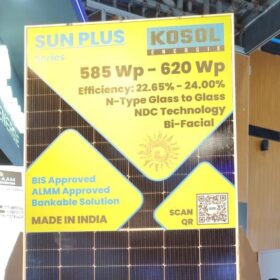Global solar investment drops due to low project costs, China policy change
While overall global investment in clean energy saw a decrease of just 1% YoY in the first half of 2018, solar’s share dropped 19% following changes to China’s PV policy and lower project costs, says Bloomberg NEF (BNEF). It forecasts this trend to continue throughout the year.
Lower module pricing will bolster PV deployment in India
More than 80% of India’s solar equipment requirements are met through imports from China. Against this backdrop, industry analysts see the predicted 30% lower module pricing, following China’s revised policy, as a good news for Indian PV projects.
Trina Solar the largest PV module supplier to India in 2017
Chinese giant boasted 18% of the Indian market, to be crowned the nation’s top dog for the third consecutive year. Canadian Solar, First Solar, Hanwha Q Cells and JA Solar also enjoyed a big export market from the rising solar power.
Ecoppia to deploy 2,000 robots at Bhadla Solar Park in Rajasthan – interview
Israel-based Ecoppia has partnered with SB Energy, a wholly-owned subsidiary of SoftBank Group Corp., to deploy 2,000 robots across its five sites in the Bhadla Phase III and IV Solar Park Project in Rajasthan, India. This announcement follows its recent completion of large-scale deployments with ENGIE and Ostro Power (Actis Group) in the Bhadla park. pv magazine speaks to Ecoppia CEO Eran Meller about the project.
India invites 2.5 GW bids for ISTS-connected wind-solar hybrid projects
The projects are to be developed on a build-own-operate basis for an aggregate capacity of 2,500 MW. The eligible bid capacity is 200-500 MW, with a project capacity of at least 50 MW at one project site. The maximum tariff payable to each project developer is fixed at Rs 2.93/kWh for the entire term of 25 years.
India adds 10.4 GW of solar in FY 2017-18, Karnataka leads the way
The Indian solar PV market saw 10.4 GW of new capacity added in the 2017-18 financial year, says Bridge to India, thus bringing cumulative installations to 24.4 GW as of this March. Leading the charge is the state of Karnataka. Concerns over the industry’s development remain, however.
India moots world’s largest solar tender – of 100 GW
If implemented, the huge tendering exercise would dwarf anything that has gone before it. Minister explains bidding will also include solar manufacturing and storage elements.
The economic case for corporate solar PPAs in India now compelling
India saw 1.8 GW of corporate solar power purchase agreements in place by the end of 2017. There was a rush of installations for PV projects due to open access waivers. The market is expected to contract slightly this year as waivers are rolled back, but there will be sustained market growth through 2023.
Minister outlines plan to become global renewables leader, at Intersolar Europe
Underlining India’s commitment to becoming the global renewable energy leader, Shri Anand Kumar, secretary of the Ministry of New and Renewable Energy, said the country plans 500 GW of capacity by 2030. He also underlined plans to become a solar and storage manufacturing hub; and said the International Solar Alliance needs to widen its membership.
Is national 225GW renewables target achievable?
There was incredulity in some quarters as the federal government raised its renewables ambition another 22%, but the stellar performance of the past four years points to the new target being a realizable one.
